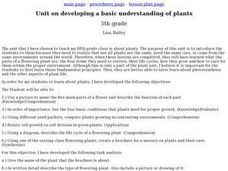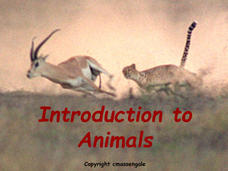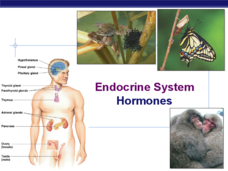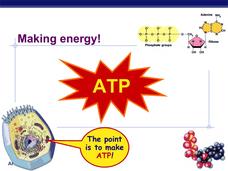Curated OER
AP: Chapter 9A: Respiration - Glycolysis
AP biologists aspire to respire with this worksheet. In it, they write short answers to 26 questions about cellular respiration. Topics addressed include the Kreb's cycle, fermentation, and more. Written as a chapter reading...
Curated OER
Circulatory Systems
Excellent diagrams, labels and summaries make this resource be valuable to your students throughout the topic of circulation. All types of circulation vessels are explained, their structure and function is detailed, and the overall...
Utah Education Network (UEN)
Utah Open Textbook: 7th Grade Science
Physical and biological factors affect everyday living. Scholars explore electromagnetic forces, motion, the rock cycle, and geological changes. They examine cells as the building blocks of life and how organisms reproduce using images...
Curated OER
AP: Chapter 26: Origin of Life
Five pages take biologists on a generalized survey of the origin of life. Queries are made regarding theories of how life developed, ancient Earth conditions, and the ever-changing field of taxonomy. The experiments of different...
Curated OER
Arthropod Life Cycle
In this arthropod life cycle worksheet, students will use a diagram showing the 4 stages of butterfly metamorphosis to complete a table describing each of the stages.
Curated OER
Ecology Study Guide
In this ecology study guide, students fill in a table about producers, consumers and decomposers, they draw the water cycle, they fill in diagrams about cell respiration, the food pyramid, protein synthesis and nitrification, population...
Biology Junction
Nonvascular and Simple Vascular Plants: Mosses to Ferns
Sometimes conservationists use specific plants to prevent erosion or fight invasive species. A 50-slide presentation covers both nonvascular and vascular plants. It discusses the plants, their stages and life cycles, reproduction, uses,...
Curated OER
Science Reproduction
Students discuss the different stages of mitosis. In this biology instructional activity, students work in pairs as they draw and diagram the stages of cell division. They discuss reproduction using pro, meta, ana and telophase.
Curated OER
Cell Growth and Division
In this biology learning exercise, 9th graders label the diagrams with the appropriate phase of mitosis illustrated. Then they explain why skin cell undergo mitosis continuously. Students also explain why mitosis is a form of asexual...
Curated OER
Sunken Lesson: Animal Growth and Heredity Grade 5
This animal growth PowerPoint includes bulleted text organized into categories including cell division, mitosis, regeneration, sexual and asexual reproduction, life cycles, metamorphosis, and inherited traits. Diagrams are included in...
Curated OER
Unit on Developing a Basic Understanding of Plants
Fifth graders study the parts of a plant, their life cycles, and how to care for them in this unit.
Teach Engineering
Solar Angles and Tracking Systems
The sun will continue to rise in the east and set in the west, no matter what. The first lesson in a series of eight introduces the class to solar angles. It makes connections between a person's latitude and the angle of position of the...
National Energy Education Development Project
Introduction to Solar Energy
People have been using solar energy for many generations to dry crops, heat homes, and for light. This presentation explains how now it is possible to capture the solar energy and store it for future use, details how and where people use...
Curated OER
Viruses
In this viruses learning exercise, students will read the 5 steps of the lytic cycle and then label those steps on a diagram starting with the virus attaching to a cell and ending with the cell opening and releasing the replicated viruses.
Curated OER
Viruses
In this virus activity, students answer questions about viruses, the parts of a virus and how viruses reproduce through the lytic and lysogenic cycle.
Curated OER
Anatomy Review: The Heart
For this anatomy review worksheet, students read through notes over the heart, label 11 diagrams and complete 7 review questions.
Curated OER
Parts of the Seed
In this biology worksheet, students read about the parts of plant seeds and look at a seed diagram. They read about the roots, endosperm, embryo, and the process of germination. They answer 8 online multiple choice questions based on the...
Curated OER
Fungi
Why did the mushroom go to the party? Because he was a fun guy! Biology learners study fungi while completing this worksheet. Structure is compared to that of other life forms. The life cycle is displayed with colorful diagrams for...
Curated OER
How Do Antiretroviral Drugs Work?
In this biology worksheet, students watch a series of videos and complete 10 short answer questions right after. They explain how ART drugs interrupt the life cycle of HIV.
Biology Junction
Introduction to Animals
Out of all animals, elephants alone lack the ability to jump. Scholars learn all about animals using a presentation full of fun examples. It describes different types of animals, the biological similarities and differences between...
Curated OER
Raven Chapter 10 Guided Notes: Photosynthesis
Kim B. Foglia has designed a comprehensive series of AP biology worksheets. This one focuses learners on the progression of photosynthesis in plants. In this assignment, they identify structures and steps on high-quality diagrams, use...
Curated OER
Endocrine System: Hormones
The many images and labeled diagrams in this PowerPoint will help learners understand different areas of the endocrine system. The slide
show starts with information about the absorption of lipid and protein based hormones, and then...
Curated OER
Making Energy: ATP
The main concepts behind how ATP transfers energy are explained in this Ap Biology PowerPoint. The diagrams convey the information that students need for any test regarding phosphorylation. The steps are clear, and should help students...
Curated OER
Respiration
In this respiration worksheet, learners label the respiration diagram, and fill in the blanks for a paragraph on respiration using a word bank. Students complete 12 words total.

























